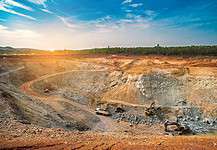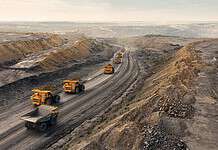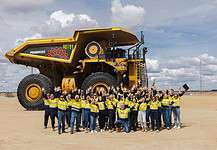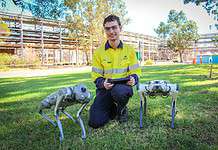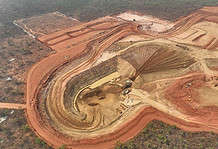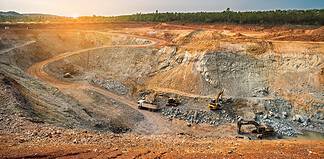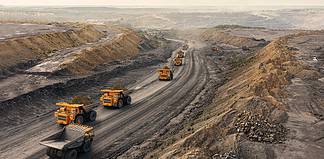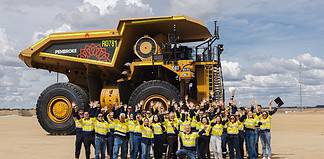BEGINNING as a small-scale concept in 2003, the annual Africa Down Under Conference has become the biggest African resources event held outside of the continent, and mirrors the remarkable rise in Australian mining interests on African soil.
Between August 29 and 31 this year, an estimated 2500 delegates visited the Pan Pacific and Novotel Langley hotels in Perth for the conference’s 10th instalment, which featured more than 70 delegate presentations, 170 exhibitors and a number of side events. The Australian Government was represented by four senior Cabinet members including Foreign Affairs minister Bob Carr and former Prime
Minister Kevin Rudd, while the African ministerial delegation included South African Mineral Resources minister Susan Shabangu plus ministers and delegations from 16 other African countries.
A speech by Australian Resources and Energy minister Martin Ferguson – delivered at the conference by Mr Rudd when Mr Ferguson was unable to attend due to illness – explained that increased economic and governmental stability across many African countries had led to a significant jump in foreign investment, which was estimated to have increased 25 per cent to about $35.6 billion in 2011 alone. At the start of 2011, there were more than 200 Australian resources companies with active interests in nearly 600 projects in Africa. Current and prospective Australian resources investment
has been estimated at US$20 billion, with new projects and prospects being identified on a weekly basis. Countries previously considered volatile and high risk, including Angola, the Democratic Republic of Congo (DRC) and Mozambique, have been attracting waves of international investors, explorers and miners.
This positive attitude was reflected in the attitudes of Africa Down Under delegates. More than 90 attendees participated in a survey aimed at gauging investor sentiment, identifying key challenges facing Australian companies operating in Africa and understanding the key growth markets in the region. According to the survey, 89.5 per cent of delegate participants expected investment in Africa by
Australian mining companies to either increase slightly (47.1 per cent) or increase significantly (42.4 per cent) during the next 12 months. Eighty per cent said their companies were likely to increase investment in the next 12 months, with South Africa (12.9 per cent), Ghana (15.3 per cent) and Botswana (15.3 per cent) considered the biggest growth areas.
However, ‘growing pains’ associated with the dawn of the ‘African Century’ — as countries on the continent move toward sustained peace and prosperity – can present a number of challenges for miners, explorers and investors alike. Widespread economic growth among the majority of African nations has not managed to quell the number of riots, strikes and other protests that have resulted from continued economic inequality. On August 10 this year, a violent strike at the Lonmin PLC platinum mine in South Africa sparked by a pay dispute culminated in the killing of 34 striking mine workers and the wounding of 78 more by police, as well as the arrest of 256 others. International investment has also been affected by a general lack of infrastructure and proposed resource nationalisation.
Many overseas companies seeking to grow sustainable, profitable long-term mining operations in Africa have expressed their need to develop a keen understanding of the complex, fragmented and multicultural nature of the continent.
Foreign investment challenges
The leader of professional services firm Deloitte’s transfer pricing team in Perth, international tax and transfer pricing partner Jacques Van Rhyn, has been practising for more than 20 years in both South Africa and Australia. Mr Van Rhyn also founded Deloitte’s Australia-Africa Services Group based on his experience in dealing with transfer pricing issues faced by mining companies investing
in Africa or with African operations.
He said that the continent was hungry for foreign investment and that ifinvestors, explorers and miners worked to understand the environment they were entering they could be richly rewarded.
“The first thing to remember is that Africa is 54 different countries, which means 54 different governments, legal systems and tax systems: there is no ‘one size fits all’,” he said.
“You need to understand the country and interact with the government, and work with them [as well as tackling] logistical issues concerning access to transport and infrastructure.”
Mr Van Rhyn described undertaking investment risk assessments for many African countries as “trying to hit a moving target” due to the inconsistent legal and taxation policies associated with the countries’ growing resource sectors. He added, however, that Australian investors, miners and explorers could manage the risks involved with African projects by interacting directly with the relevant
governments and local communities.
“The one thing that people need to understand is that there is a history, a bad history, of foreign investment into Africa: people not paying their fair share of taxes, not investing in the people, and then just leaving Africa and not leaving anything behind,” Mr Van Rhyn said.
International law firm Allen & Overy partner Peter Wilkes and his team have worked on African transactions for a number of mining companies including Aquarius Platinum and Realm Resources in South Africa,
Bellzone Mining in Guinea, Equinox Minerals in Zambia and Tanzanite One in Tanzania. He said that there was a push from within Africa to try and build towards uniformity across the many jurisdictions in an effort to encourage mining investment.
“The African Mining Vision [report], which was published back in 2008 by a group of ministers responsible for resource development across a whole range of countries in Africa, had the common goal to maximise the broader returns to African countries from mining,” he said.
Mr Wilkes said it was critical for investors to understand the jurisdiction in which they were investing.
“There are also different legal regimes across the different jurisdictions, depending on whether they are an all-English colony, European [or] French: there are different influences that have been brought to bear on the legal systems that they have adopted,” he said. ‘On-the-ground’ risk assessment Australian-based international emergency management provider Dynamiq develops strategies for
organisations around the world. Founder and chief executive Anthony Moorhouse specialises in helping companies to meet their duty of care obligations to staff operating in remote and hostile environments.
Mr Moorhouse has regional expertise in Africa, where Dynamiq has about 175 clients operating. This figure is increasing by more than five per month. He said he believed the continent posed some unique challenges to Australian mining companies.
“It’s such a complex continent, with some very safe, benign countries and some extremely volatile countries,” Mr Moorhouse said.
“There are countries in states of civil war, tribal feuds and then there are others which are relatively benign and quite safe – if somewhat underdeveloped – to do business in,” he said.
Mr Moorhouse said that mining companies with successful African operations and projects had incorporated robust risk management systems as an integral part of their operating strategies. In the case of emergency response capabilities, he said he believed that well-structured overseas operators accurately identified that they could be extremely isolated and needed to take a level of responsibility for their own welfare.
“They go into it with their eyes open, understanding the risk and mitigating that risk,” he said.
“The ‘cowboys’ are operating in the far-flung corners of the continent where to get a medical response – aircraft or helicopter – could take 24 hours or longer. But they assume that a simple business travel insurance policy will get them out and they don’t have to take any responsibility for themselves.”
Mr Moorhouse said much of the risk associated with African mining and exploration projects could be mitigated by improved infrastructure pipelines between nations. According to International Monetary Fund data, African countries are expected to be among the world’s fastest growing economies during the next few years.
With growth rates of more than 8 per cent predicted for countries including Ethiopia, Mozambique and Ghana, Mr Moorhouse said he hoped to see a significant increase in social infrastructure development associated with mining projects in the region.
“One of the hopes is that over the next decade, with this mining investment, the countries are getting great royalties from these projects as they move in to production,” he said. “The money, in theory, is there to support the local communities with improved social infrastructure such as roads, medicine and education.”
Community interaction
Mr Moorhouse said he believed that continual interaction with local communities was essential for the sustainability of any mining operation in Africa. While most Australian mining companies are proficient at gaining project approvals through authorised channels, getting the locals ‘on side’ can be very important from a safety and security point of view. “We often find that it is cheaper and far more beneficial to have a security manager who has worked in that country, understands the culture, speaks the language and has good relationships with the police etc,” he said.
“That is far more efficient than building a very big fence and trying to isolate your company from the local community.”
Perth-based gold explorer and developer Middle Island Resources has four highly-prospective projects covering about 5500 square kilometres, including Reso in Burkina Faso, Nuon River in Liberia, and Nassile and Dogona in Niger.
As part of its efforts to facilitate sustained and positive interaction with the communities in which it operates, the company has committed 5 per cent of its exploration budget each year to social development initiatives.
Implemented from the outset of exploration, these aim to build sound working relationships in anticipation of project development.
Middle Island community relations manager Sarah Mackenzie said that working in three different countries required different approaches to community engagement. She said that while Niger and Burkina Faso had similar systems of government and were at different stages in a decentralisation process, Liberia, which was still recovering from the lingering effects of civil war and associated economic disorder, had thrown up a unique set of challenges for the company. Ms Mackenzie said that those in charge at Liberia’s local county administrative level were appointed by the central government.
To ensure that Middle Island was communicating with the appropriate people, the company had to work closely with the county and those at a local level, such as chiefdoms and clans.
“We are living and working in these communities – if you find a viable resource and it becomes a mine – for 20 or more years,” she said.
“So it is very important to build relationships from the outset: informing and interacting with the community from the beginning, even at the exploration stage.”
Ms Mackenzie said that companies also had to be flexible in understanding local customs, attitudes and the issues that each community faced.
“The local community at our Liberia project felt resentful that we had gone to interact with the local county authorities because they were worried that the county authorities would say ‘you must give us money and we will distribute it’,” she said.
“They told us not to go to the county authorities because they would take the money for themselves.
“There are different groups within society and the company needs to make sure that we are engaging with all of them – openly and transparently – so no one group feels they have been marginalised, or that we have been prioritising one group over another.”
Australia’s role
Speaking at the Africa Down Under conference, Coffey Mining general manager Africa Chris Fredericks said that Australian miners and explorers had a role to play in ensuring the continued emergence of the ‘African Century’, driven by the continent’s mineral wealth. He said Australian mining companies were well positioned to provide a wealth of mining knowledge and expertise to Africa, benefitting both themselves and the countries and communities in which they operated.
“Australian resources investments have tripled to $20 billion since 2005, and it is that sort of commitment that is helping Africa continue to make the transition to world economic powerhouse,” Mr Fredericks said.
“The investment upside in Africa is increasing levels of available risk capital, new reserves, new ore replacement efforts, new discoveries, changing exploration costs, more attractive mining laws and investment incentives, and availability of dependable geological information,” he said.
Mr Fredericks said from a technical point of view, Australian mining companies had barely scratched the surface in Africa. Ultimately, to help translate the continent’s mineral riches into sustained economic returns for all vested interests, he said overseas miners and explorers needed to instil a legacy of local training and safety, as well as a sense of social and community responsibility.
Advertisement


